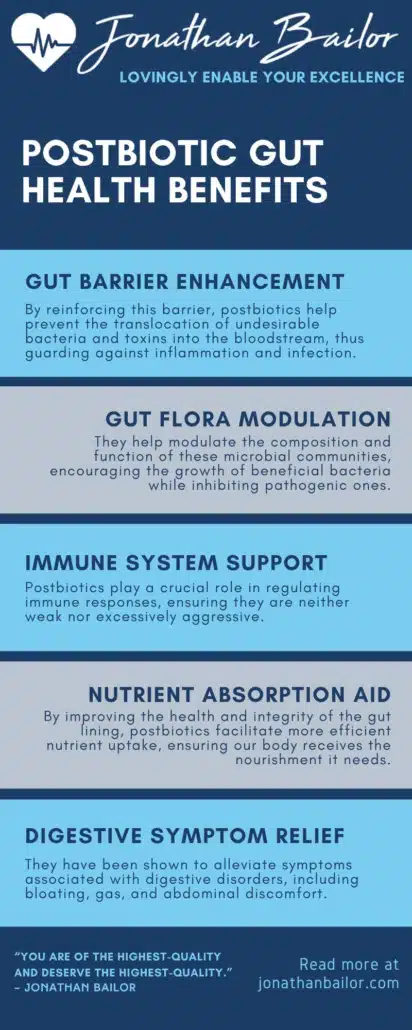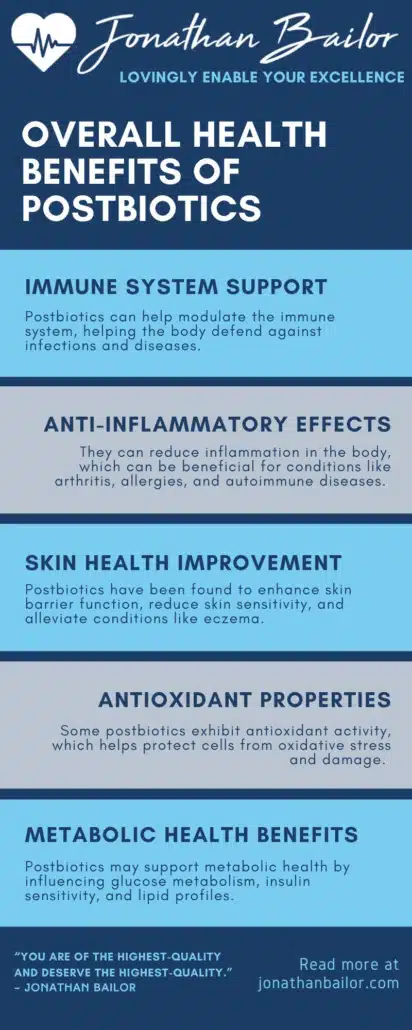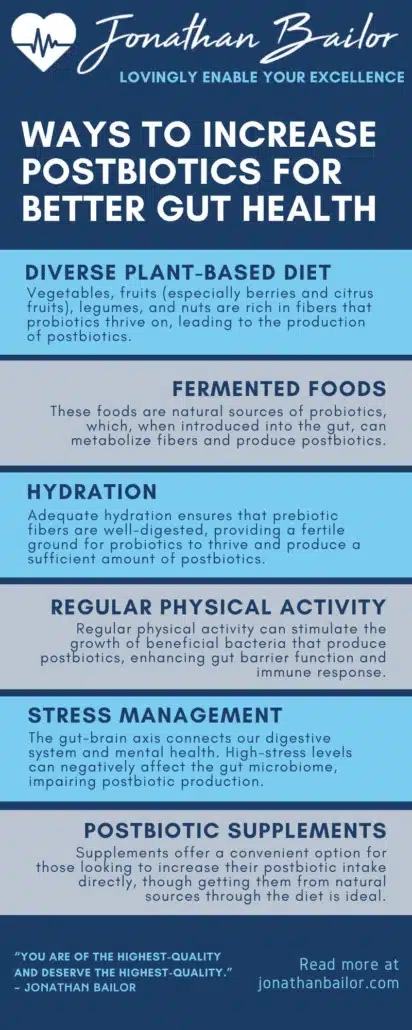Revolutionizing Gut Health: The Postbiotic Breakthrough
The spotlight has often shone brightly on the combination of probiotics and prebiotics in the pursuit of optimal health. These two have been heralded as the heroes of gut health, promising to balance our digestive systems and enhance our overall well-being. But as the curtain rises on the latest act in the saga of gut health, a new star emerges on the horizon: postbiotics. Jonathan Bailor discusses the amazing benefits of postbiotics in this Gut Health Guide.
Postbiotics might sound like the newest members of a scientific health trend. Still, they represent a natural progression in understanding how the gut ecosystem works harmoniously with our bodies. This breakthrough isn’t just another stride in nutritional science; it’s a revolution in how we approach wellness from the inside out.
We’ve navigated the complex world of supplements and dietary advice for too long, often feeling overwhelmed by the dos and don’ts that seem to change with the seasons. But what if the key to unlocking a treasure trove of health benefits was already within us, waiting to be recognized for its full potential? Enter postbiotics: the transformative compounds produced when the probiotics in our gut feast on the prebiotic fibers we consume.
What makes postbiotics so exciting isn’t just their role in gut health; it’s their ability to support our immune system, reduce inflammation, and even contribute to our mental well-being. This is not just about taking care of one part of our bodies; it’s about fostering a holistic environment where every aspect of our health can flourish.
As we explore the promise of postbiotics, let’s remember that this journey is about discovery and empowerment. It’s about uncovering the layers of complexity within our bodies and learning to nurture ourselves in the most natural and effective ways possible. This isn’t just science; it’s a personal journey towards a healthier, happier life.
So, as we stand on the brink of this postbiotic breakthrough, let’s embrace the opportunity to transform our health, armed with the knowledge that the future of wellness lies not in the latest fad or quick fix but in understanding and supporting the intricate systems that make us who we are. Share this journey with friends and family because when it comes to health, the most profound changes come from the discoveries we make together.
What is a Postbiotic?
Amidst the bustling ecosystem of our gut, where probiotics and prebiotics have long held the stage, postbiotics emerge as a testament to the body’s remarkable ability to generate its own health-enhancing compounds. These substances, produced when probiotics in our digestive system process prebiotic fibers, are the unsung heroes in the narrative of gut health. They embody the essence of transformation, turning dietary fibers into a plethora of benefits that extend far beyond the confines of our digestive tract.
Postbiotics encompass a diverse array of molecules, including short-chain fatty acids, which are pivotal in nourishing the cells lining our gut, to antimicrobial peptides that fortify our defenses against harmful bacteria. Their role is multifaceted, offering not just support for our digestive health but also acting as a bridge to bolster our immune system, modulate inflammation, and even influence our mood. This synergy of benefits highlights the interconnectedness of our body’s systems, underscoring the holistic approach postbiotics bring to fostering well-being.
Unraveling the Trio: Probiotics, Prebiotics, and Postbiotics
In the vibrant landscape of gut health, three key players work in concert to maintain the delicate balance of our digestive ecosystem. Each with its own unique role, probiotics, prebiotics, and postbiotics form a trifecta of gut health champions, ensuring our bodies operate in harmony. Here’s a brief look at how each one contributes to our well-being:
Probiotics
These are live, beneficial bacteria that reside in our digestive tract, forming a crucial part of our microbiome. By enhancing the good bacteria in our gut, probiotics help in digestion, boost our immune system, and protect against harmful bacteria.
Prebiotics
As the fuel for probiotics, prebiotics are non-digestible fibers found in foods like garlic, onions, and bananas. They encourage the growth and activity of beneficial gut bacteria, facilitating a healthy digestive environment.
Postbiotics
The beneficial compounds are produced when probiotics break down prebiotic fibers. These include vital substances such as short-chain fatty acids, which profoundly impact gut health, immune function, and overall wellness.
Together, this trio underscores the complexity and interconnectedness of our gut health, each playing a pivotal role in nurturing and sustaining our body’s internal ecosystem.
The Core of Wellness: Gut Health Benefits of Postbiotics
In the realm of gut health, postbiotics have emerged as pivotal agents of harmony and health within our digestive ecosystem. They are not just by-products of the interaction between prebiotics and probiotics but are key contributors to the maintenance and enhancement of our gut health. Here, we explore the multifaceted benefits of postbiotics, focusing solely on their impact on the digestive system. Each benefit sheds light on how these potent compounds contribute to a robust and resilient gut, further affirming their role as essential elements in our journey toward optimal health.
Enhancing Barrier Integrity
One of the most critical roles postbiotics play in gut health is strengthening the intestinal barrier. This barrier is our frontline defense against harmful substances and pathogens. By reinforcing this barrier, postbiotics help prevent the translocation of undesirable bacteria and toxins into the bloodstream, thus guarding against inflammation and infection. The integrity of this barrier is crucial for overall health, and postbiotics are instrumental in ensuring its robustness, showcasing their vital role in maintaining the body’s first line of defense against external threats.
Modulating Gut Flora
Postbiotics contribute significantly to the balance of our gut microbiome, the complex community of microorganisms in our digestive tract. They help modulate the composition and function of these microbial communities, encouraging the growth of beneficial bacteria while inhibiting pathogenic ones. This delicate balancing act is crucial for digestive health and function, illustrating how postbiotics support a harmonious gut environment conducive to well-being and disease prevention.
Supporting Immune Function
Within the gut lies a substantial portion of the body’s immune system, and postbiotics play a crucial role in its regulation. They help modulate immune responses, ensuring they are neither weak nor excessively aggressive. This regulation is vital for preventing autoimmune disorders and inflammatory conditions, such as Crohn’s disease and ulcerative colitis, within the gastrointestinal tract, highlighting postbiotics’ role in fostering a balanced immune landscape within the digestive system.
Promoting Nutrient Absorption
Postbiotics can enhance the gut’s ability to absorb essential nutrients, such as minerals and vitamins, from our diet. By improving the health and integrity of the gut lining, postbiotics facilitate more efficient nutrient uptake, ensuring our body receives the nourishment it needs. This benefit is crucial for overall health, as nutrient absorption is fundamental to energy levels, immune function, and cellular repair processes.
Alleviating Symptoms of Digestive Disorders
For individuals experiencing digestive disorders such as irritable bowel syndrome (IBS) or inflammatory bowel disease (IBD), postbiotics offer a beacon of hope. They have been shown to alleviate symptoms associated with these conditions, including bloating, gas, and abdominal discomfort. By modulating the gut environment and immune response, postbiotics can help reduce inflammation and normalize bowel movements, offering relief to those suffering from chronic digestive issues.
Through these benefits, postbiotics underscore their indispensable role in the ecosystem of gut health. They not only contribute to the physical well-being of the digestive tract but also the balance and harmony of the microbiome and immune system residing within it. As we continue to uncover the depths of their impact, it becomes clear that postbiotics are foundational to the narrative of gut health, acting as custodians of our digestive wellness.

Feeling Better Is Priceless, That's Why We Don't Put A Price On It!
“It’s Like A Free and Medically Valid Version of Noom and Weight Watchers Online”
~ Dr. Doctor Matthew Oleshiak, MD
Click the 'LEARN MORE' button below for free lifetime access to the fast fix program developed by Jonathan and top Ivy League Medical Doctors
LEARN MOREP.S. It's not a free trial. It's not part of the program for free. The entire program is free, forever, for real! No credit card needed.
Beyond the Gut: The Broad Spectrum of Postbiotic Benefits
While the narrative around postbiotics often centers on their pivotal role in gut health, their influence extends far beyond the confines of our digestive system. These potent compounds, born from the symbiotic relationship between prebiotics and probiotics, are key players in a range of bodily functions, contributing to our overall health and well-being. Here’s a glimpse into the wide-reaching effects of postbiotics on our health:
Postbiotics exert a profound impact on our immune system. Modulating immune responses, they help fortify our defenses against pathogens, reducing the likelihood of infections and bolstering our body’s ability to fight illness. Their role in immune health is a testament to how our gut health is inextricably linked to our body’s overall resilience.
Moreover, postbiotics have been shown to have anti-inflammatory properties, offering promise in mitigating chronic inflammation—a root cause of numerous health conditions, from heart disease to diabetes. This anti-inflammatory action underscores the potential of postbiotics to contribute to the prevention of chronic diseases, showcasing their importance in maintaining long-term health.
Additionally, the influence of postbiotics extends to mental health, with emerging research suggesting their role in mood regulation and cognitive function. This connection between postbiotics and brain health highlights the profound impact our gut health can have on our mental well-being, emphasizing the holistic nature of postbiotics’ health benefits.
In summary, the benefits of postbiotics reach far and wide, offering promising implications for immune health, chronic disease prevention, and mental well-being, thus underscoring their significance in the broader context of holistic health maintenance.

Nourishing the Gut: 6 Ways to Increase Postbiotics for Gut Health
In our quest for optimal gut health, understanding how to increase the presence of postbiotics in our digestive system naturally becomes a cornerstone of our wellness journey. Unlike grabbing a supplement off the shelf, fostering a gut environment rich in postbiotics involves nurturing a holistic dietary and lifestyle pattern that supports the symbiotic relationship between prebiotics, probiotics, and the resulting postbiotics. Here, we explore five natural strategies to enrich our gut with these beneficial compounds, emphasizing practices that integrate seamlessly into daily life and contribute to our overall well-being.
1. Diverse Plant-Based Diet
Incorporating a wide variety of plant-based foods into our diet is a foundational step toward increasing postbiotics in the gut. Vegetables, fruits (especially berries and citrus fruits), legumes, and nuts are rich in fibers that probiotics thrive on, leading to the production of postbiotics. Each plant brings its own unique type of fiber, supporting a diverse microbiome capable of producing a wide array of postbiotics. This diversity not only enriches our gut environment but also enhances the overall resilience and health of our digestive system. In fact, a plant-based diet has been shown to help prevent colon cancer.
2. Fermented Foods
Embracing fermented foods such as kimchi, sauerkraut, and fermented dairy alternatives can be a direct route to boosting postbiotic levels. These foods are natural sources of probiotics, which, when introduced into the gut, can metabolize fibers and produce postbiotics. Including fermented foods in our daily diet ensures a continuous supply of these beneficial bacteria, promoting a gut environment ripe for postbiotic production and maintaining a healthy digestive tract.
3. Hydration
Staying adequately hydrated is often overlooked in discussions about gut health. Water plays a crucial role in the digestive process, facilitating the smooth transit of food through the gut and supporting the activities of both prebiotics and probiotics. Adequate hydration ensures that prebiotic fibers are well-digested, providing a fertile ground for probiotics to thrive and produce postbiotics. This simple yet effective habit is essential for optimizing the production of postbiotics and maintaining a healthy gut ecosystem.
4. Regular Physical Activity
Exercise profoundly impacts gut health, influencing the composition and activity of the gut microbiome. Regular physical activity can stimulate the growth of beneficial bacteria that produce postbiotics, enhancing gut barrier function and immune response. This relationship between exercise and gut health highlights the importance of incorporating regular movement into our routines, not just for our overall fitness but also for the vitality of our digestive system.
5. Stress Management
The gut-brain axis illustrates the interconnectedness between our digestive system and mental health. High-stress levels can negatively affect the gut microbiome, impairing the production of postbiotics. Implementing stress-reduction techniques such as meditation, yoga, or deep-breathing exercises can help maintain a balanced gut environment conducive to postbiotic production. By managing stress, we support not only our mental well-being but also create a nurturing environment for our gut health.
6. Postbiotic Supplements
Supplements offer a convenient option for those looking to increase their postbiotic intake directly. While incorporating natural sources through diet is ideal, high-quality postbiotic supplements can provide a targeted boost, especially for individuals seeking to address specific gut health concerns. However, because postbiotics are a relatively new concept in gut health, they are not as common as any probiotic supplement.
Look for supplements containing Tributryn, as this is the most absorbable form of butyrate, a postbiotic metabolite that offers the most gut health benefits. It’s important to choose supplements from reputable sources and consult with a healthcare provider to ensure they align with your health needs and goals.
By adopting these practices, we can naturally increase the presence of postbiotics in our gut, fostering a robust and healthy digestive system. These strategies, rooted in dietary choices, hydration, physical activity, and stress management, offer a holistic approach to gut health, emphasizing the natural synergy between our bodies and the foods we consume.

Gut Health Essentials: Your Questions Answered
In the journey towards understanding and nurturing our gut health, questions are as natural as the very process of digestion itself. With the complex interplay of diet, lifestyle, and the microbiome, it’s understandable to seek clarity on how best to support this foundational aspect of our well-being. Here are answers to five frequently asked questions about gut health, aiming to shed light on how you can foster a thriving digestive ecosystem.
1. Can changing my diet really improve my gut health?
Absolutely! Your diet plays a pivotal role in shaping the health of your gut. Incorporating a variety of plant-based foods rich in fiber can significantly boost the diversity and number of beneficial bacteria in your gut. These beneficial bacteria, in turn, produce postbiotics that support gut health and overall well-being. They can even help reduce IBD symptoms. Focusing on fresh, whole foods and minimizing processed foods can create a gut-friendly dietary pattern, promoting a balanced microbiome.
2. How important are probiotics for gut health?
Probiotics are essential for maintaining a healthy gut. They are live beneficial bacteria that, when ingested in adequate amounts, can offer health benefits, particularly for our digestive system. Probiotics help balance the gut microbiota, preventing the overgrowth of harmful bacteria. They can be found in fermented foods or supplements and are crucial in enhancing immune function, reducing inflammation, and supporting nutrient absorption.
3. Do I need to take supplements to have a healthy gut?
While supplements can be beneficial, especially for probiotics and specific vitamins, they are not always necessary for everyone. A well-balanced diet rich in fiber, plant-based foods, and fermented products can provide most of the nutrients and probiotics your gut needs. Before turning to supplements, consider adjusting your diet and lifestyle. However, in some cases, a healthcare professional may recommend supplements based on individual health needs and nutritional deficiencies.
4. Is there a connection between gut health and mood?
Yes, there’s a profound connection between the gut and the brain, often called the gut-brain axis. This bi-directional communication pathway means that the state of our gut can influence our mood and vice versa. Beneficial gut bacteria produce neurotransmitters, like serotonin, which play a role in mood regulation. Hence, a healthy gut can contribute to improved mood and mental health, highlighting the importance of gut health beyond just digestive wellness.
5. How quickly can I see improvements in my gut health after changing my diet?
Improvements in gut health can begin in as little as a few days to a couple of weeks after making dietary changes. The gut microbiome is highly responsive to the food we consume. By increasing your intake of fiber, fermented foods, and a wide array of plant-based foods, you can start to notice changes in digestion, reduced bloating, and a general feeling of well-being. Consistency is key, as sustained dietary habits contribute to long-term gut health.
Understanding gut health is a step towards empowering ourselves with the knowledge to make informed decisions about our diet and lifestyle. By nurturing our gut, we support our overall health, paving the way for a happier, healthier life.
Embracing Gut Health: A Journey to Share
As we conclude our exploration of gut health, it’s clear that the journey to wellness is not one we walk alone. The insights into postbiotics, along with the natural ways to support our digestive ecosystem, illuminate a path toward not just better health for ourselves but also for those we care about. Let’s take this knowledge beyond our own experience, sharing these revelations with friends and family through social media and email. By spreading the word, we foster a wellness community, encouraging others to embrace their gut health and discover its profound impact on overall well-being. Together, let’s cultivate a brighter, healthier future.
Feeling Better Is Priceless, That's Why We Don't Put A Price On It!
“It’s Like A Free and Medically Valid Version of Noom and Weight Watchers Online”
~ Dr. Doctor Matthew Oleshiak, MD
Click the 'LEARN MORE' button below for free lifetime access to the fast fix program developed by Jonathan and top Ivy League Medical Doctors
LEARN MOREP.S. It's not a free trial. It's not part of the program for free. The entire program is free, forever, for real! No credit card needed.




